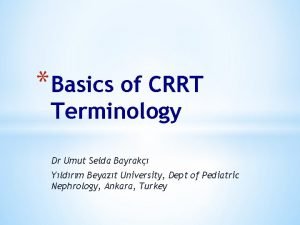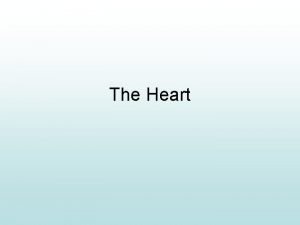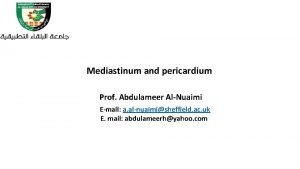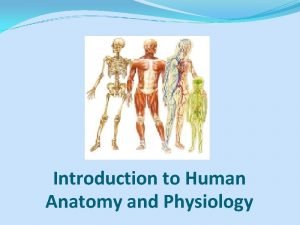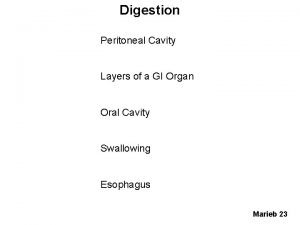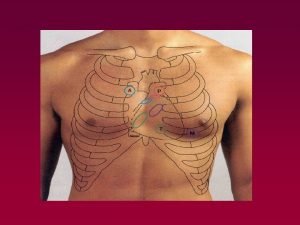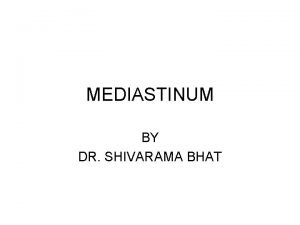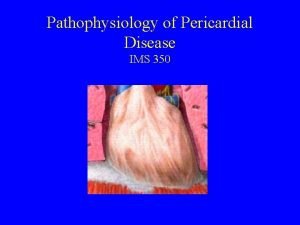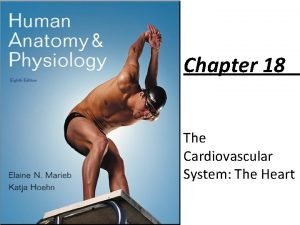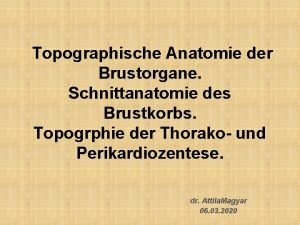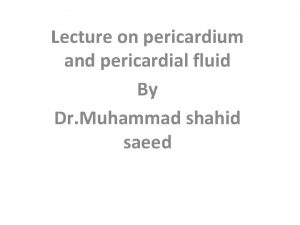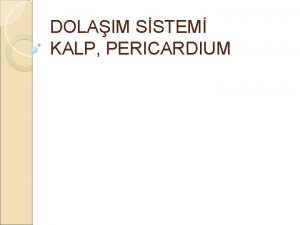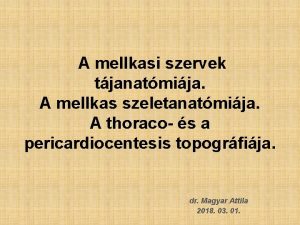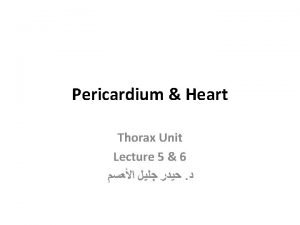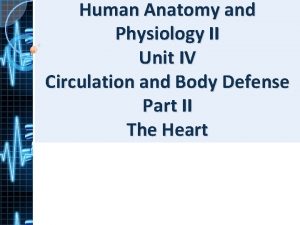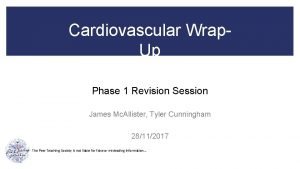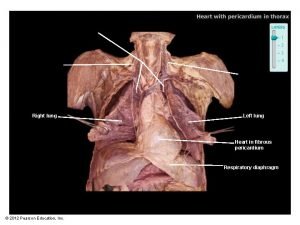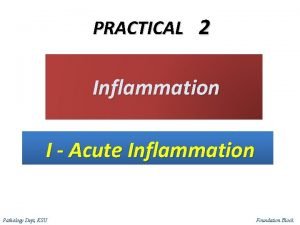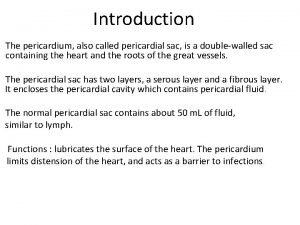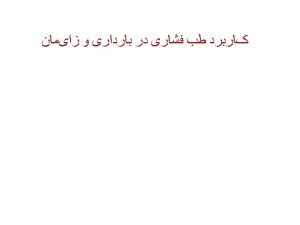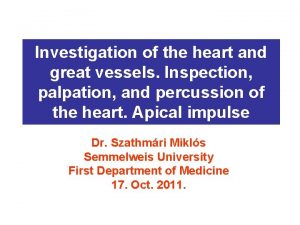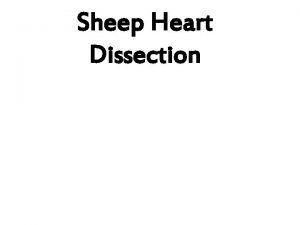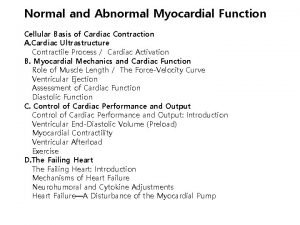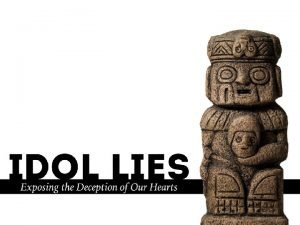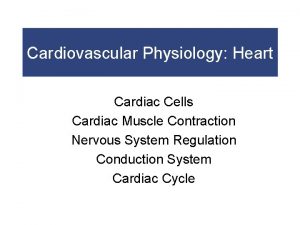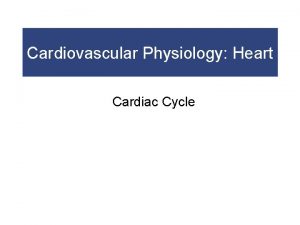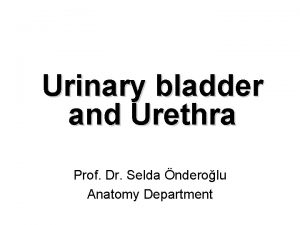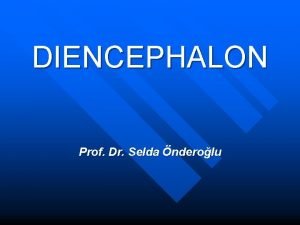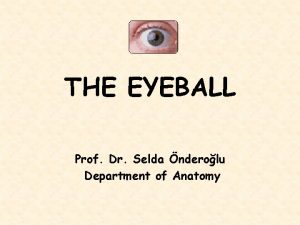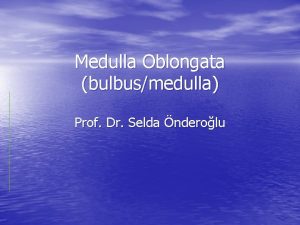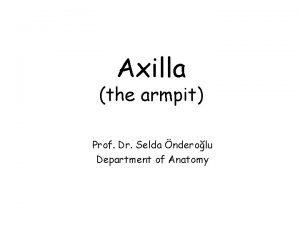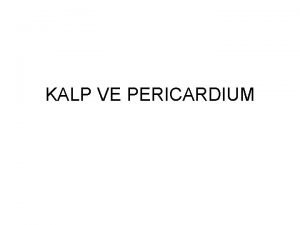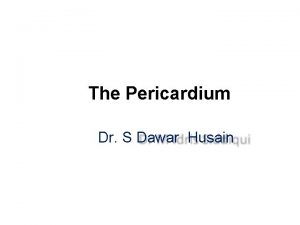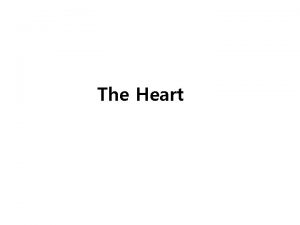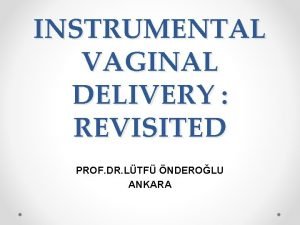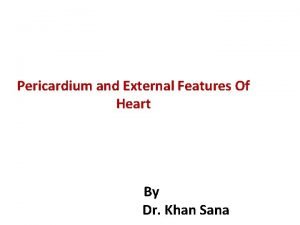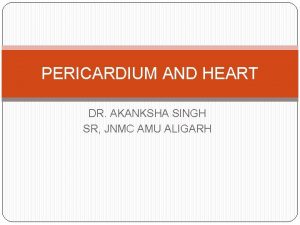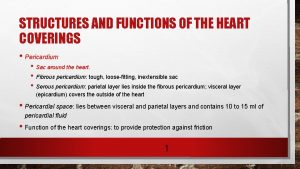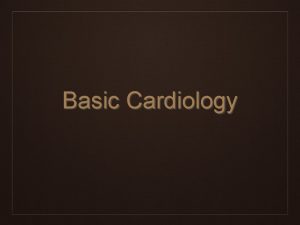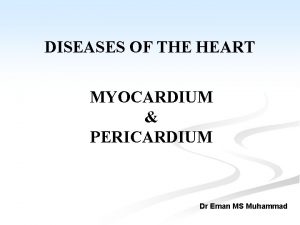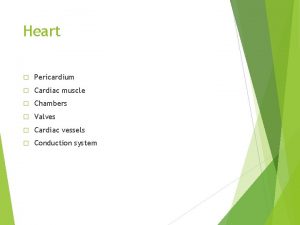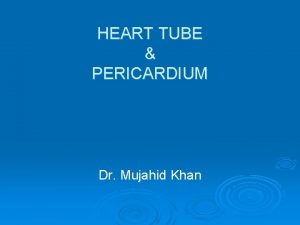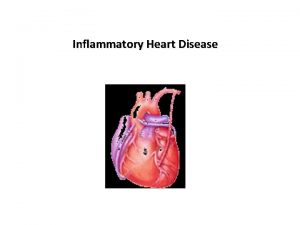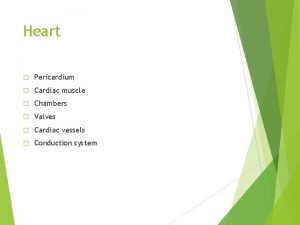Heart and Pericardium Prof Dr Selda nderolu Prof
















































- Slides: 48

Heart and Pericardium Prof. Dr. Selda Önderoğlu Prof. Dr. H. Selçuk Sürücü

heart muscular organ Pumps blood to body. Shape: conical Apex is directed downwards


location: thoracic cavity Middle mediastinum Weight: 250 -300 gr. In the adult

relations Right and left: mediastinal surfaces of the lungs inferior: Diaphragm Anterior: : Sternum, costal cartilages, remains of thymus gland partially lungs Posterior: Oesophagus

General shape Apex Base 4 surfaces Four borders Apex: directed anterior, inferior and to the left, Base: faces posteriorly and to the right


Apex L ventricle Forward, downward&to the left Prof. Dr. H. Selçuk Sürücü

Base L & R atria Faces posteriorly Prof. Dr. H. Selçuk Sürücü

Diaphragmatic (inf) surface L ventricle Prof. Dr. H. Selçuk Sürücü

Sternocostal (ant) surface R atrium R ventricle L ventricle Prof. Dr. H. Selçuk Sürücü

+ v brachiocephalica

Inf border R ventricle L ventricle

Sup border L atrium, roots of great vessels

Right and left borders Right border, Right atrium. Left border, left ventricle, left auricle.

Surface projections of borders Apex: 5 th intercostal space 9 cm from midline 2 nd left costal cartilage 1 cm from sternum 3 rd right costal cartilage 1 cm from sternum 6 th right costal cartilage 1 cm from sternum Prof. Dr. H. Selçuk Sürücü

External features “ coronary sulcus”, between atria and ventricles. “anterior interventricular sulcus”, between ventricules “posterior interventricular sulcus”, between ventricles

R atrium V cava sup&inf Coronary sinus Pectinate mm Sinus venorum (sinus of venae cavae) Terminal crest Interatrial septum Foramen ovale Fossa ovalis Limbus fossa ovalis Auricle (ant. to crest) Tricuspid valve (bw. R atr. &R vent. ) Prof. Dr. H. Selçuk Sürücü

R ventricle Cusps of tricuspid valve/R atrioventricular valve (at sup wall) (ant. +post. +septal) Interventricular septum (septal wall) Pro. Membranous part muscular part Atrioventricular part ( bw. R atr&L ventr. )

R ventricle Trabeculae carnea Papillary mm (ant+post+septal) Septomarginal trabecule (moderator band) Conus arteriosus (infundibulum) Supraventricular crest Opening of pulmonary trunk (has 3 semilunar cusps. R+L+Ant)





L atrium Pulmonary vv openings (4 in number) Valve of foramen ovale During development prevents blood from L atr. to R atr) Auricle Mitral valve/ L atrioventricular valve (Ant+post cusps) Prof. Dr. H. Selçuk Sürücü

L ventricle Cusps of mitral valve/L atrioventricular valve (Ant+post cusps) Papillary mm(ant+post) Chordae tendineae Trabecula carneae Aortic opening Aortic valve ( R+L+post semilunar cusps) (each cusp has lunule, nodule, sinus)

Arteries of heart R&L coronary aa- Both Exit from bulbus aorta Right coronary artery (R marginal br &Post interventricular br) Left coronary artery (Circumflex br+Ant interventricular br)


Prof. Dr. H. Selçuk Sürücü

Veins of heart coronary sinus-receives great, middle, small&post. Cardiac v) Least cardiac vv (venae cordis minimae-Thebasian vv)directly into chambers Anterior right ventricular vv Right marginal v

Great cardiac v Ant interventricular v L coronary v

Small cardiac v R coronary v

Middle cardiac v Post interventricular v

Innervation of heart Symp Psymp Together They form the cardiac plexus

Sympathetics Sup cervical cardiac n (from sup. Cerv. Gang. ) Middle cervical cardiac n br(from middle cerv. gang. ) Inf cervical cardiac n (from cervicothoracic (stellate)gang. Thoracic cardiac brrs (T 1 -4)

Parasympathetics (vagus nerve (CN X) Sup cervical cardiac brr inferior cervical cardiac brr Thoracic cardiac brr ( of vagus n. )

Lymphatics of heart R inf tracheabronchial lymph nodes

Layers of heart Endocardium: innermost layer Myocardium: middle layer, muscular layer, striated, under control of autonomic nervous system Pericardium: outermost layer, like a sac

Myocardium Atrial Ventricular Conducting system Striated-special type Under autonomic nervous system control Atrial muscle fibers: 2 layers (inner-each atrium, outer- two atria together) Ventricular muscle fibers- has complex structure, no distinct layers- vortex

Myocardium Prof. Dr. H. Selçuk Sürücü


Skeleton of heart R & L fibrous rings (around mitral&tricuspid valves R & L fibrous trigones Around aortic & pulmonary Prof. Dr. H. Selçuk Sürücü valves

Conducting system of heart- specialised myocardial fibers SA node at terminal crest AV node, at interaatrial septum AV bundle, pars membranacea R & L bundle branches Purkinje fibers


Pericardium Fibrous pericardium Serous pericardium Parietal layer Visceral layer (epicardium) “pericardial cavity ” “liquor pericardii”

Pericardial sinuses-of the pericardial cavity Oblique sinus Bw. Left atrium- Pulmonary vv Like the letter “j”, inverted Transverse sinus superior v. c. &leftatriumpulmonary trunk&ascending aorta two ends open

nerves of pericardium Phrenic n –parietal pericardium (afferent) vagus Sympathetic trunk

Aorta ascending aorta Arch of aorta descending aorta
 Selda bayrak
Selda bayrak Selda kavak
Selda kavak What membrane covers the heart
What membrane covers the heart Sheep heart pericardium
Sheep heart pericardium Mediastinum contents
Mediastinum contents Pericardium pleura and peritoneum
Pericardium pleura and peritoneum Pericardium pleura and peritoneum
Pericardium pleura and peritoneum Septal ventricular defect
Septal ventricular defect Mediastinum anatomy
Mediastinum anatomy Kassmaul sign
Kassmaul sign What intercostal space is the pulmonic valve
What intercostal space is the pulmonic valve Thymusdreieck
Thymusdreieck Pericardium
Pericardium Ostium trunci pulmonalis
Ostium trunci pulmonalis Mellkasi szervek
Mellkasi szervek Base and apex of the heart
Base and apex of the heart Visceral pericardium
Visceral pericardium Reticulocyte characteristics
Reticulocyte characteristics Left lung
Left lung Granulation tissue
Granulation tissue Applied anatomy of pericardium
Applied anatomy of pericardium Pericardium-6
Pericardium-6 Right border of the relative cardiac dullness is formed by
Right border of the relative cardiac dullness is formed by Sheep heart anatomy
Sheep heart anatomy Stars plowhorses puzzles dogs
Stars plowhorses puzzles dogs Conclusion of growth and development
Conclusion of growth and development Prof ram meghe institute of technology and research
Prof ram meghe institute of technology and research The tell tale heart figurative language
The tell tale heart figurative language Lvedp normal range
Lvedp normal range Rabbit heart lyrics
Rabbit heart lyrics Clockwork orange
Clockwork orange Do not grow weary and lose heart
Do not grow weary and lose heart Clean hands and a pure heart bednar
Clean hands and a pure heart bednar Negative connotation
Negative connotation Heart surface anatomy
Heart surface anatomy Head heart hands feet model social work
Head heart hands feet model social work Thoughts and intentions of the heart
Thoughts and intentions of the heart Sing and make music in your heart to the lord
Sing and make music in your heart to the lord Who sings heart and soul
Who sings heart and soul David powlison idols of the heart
David powlison idols of the heart Difference between cyanotic and acyanotic heart disease
Difference between cyanotic and acyanotic heart disease Relative refractory period
Relative refractory period The tell-tale heart mood and tone answer key
The tell-tale heart mood and tone answer key Prayer is the raising of the heart and mind to god
Prayer is the raising of the heart and mind to god Symbols heart of darkness
Symbols heart of darkness Ginger for the heart
Ginger for the heart From the inside out joel houston
From the inside out joel houston Heart sounds and murmurs
Heart sounds and murmurs British heart foundation aims and objectives
British heart foundation aims and objectives
